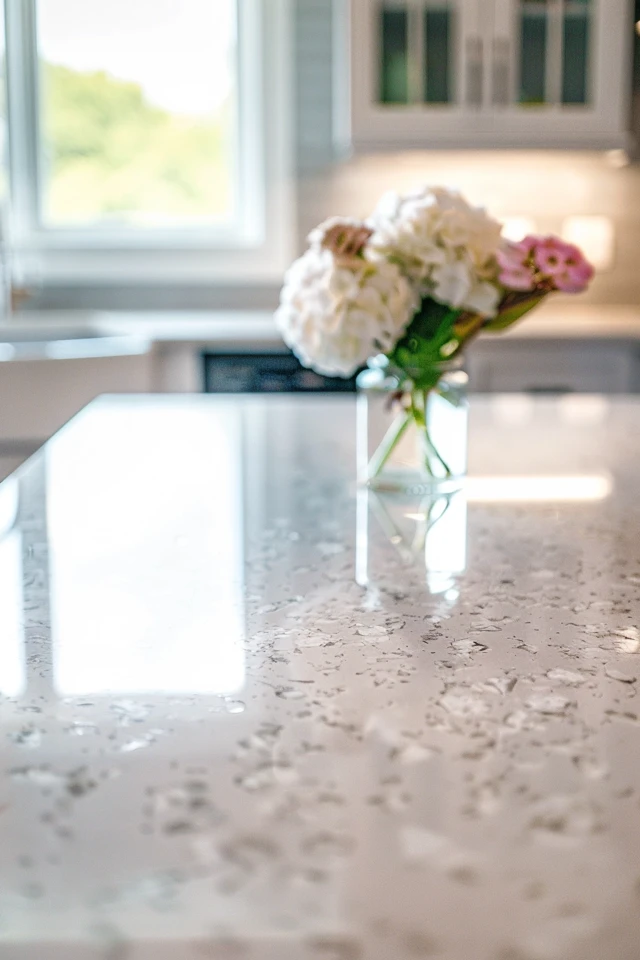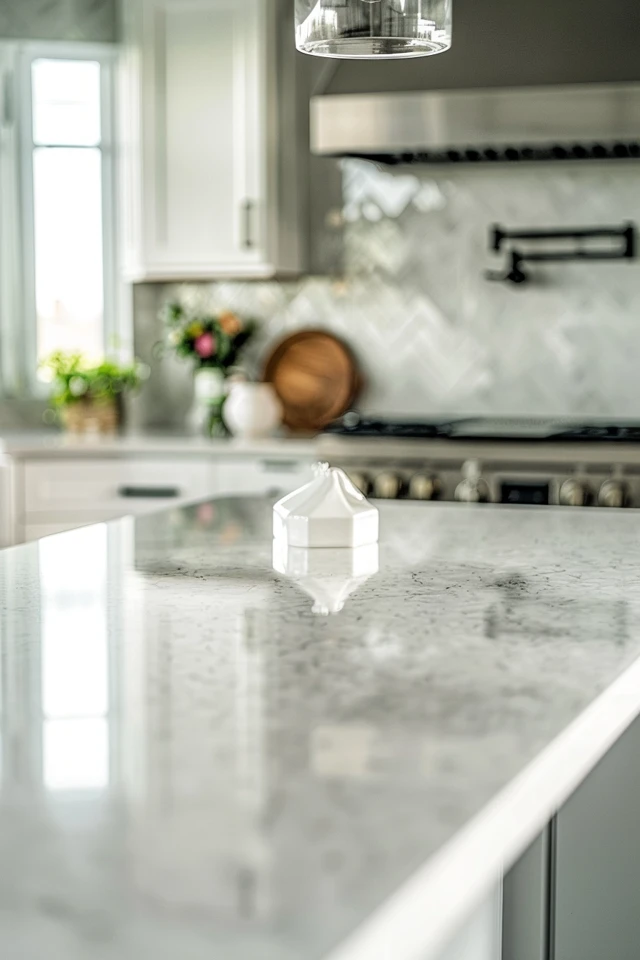Quartz countertops have become increasingly popular in kitchens and bathrooms for their durability, wide range of colors and patterns, and resistance to stains and bacteria. Caesarstone quartz countertops, such as the 5151 Empira White, offer both style and functionality without the need for extensive maintenance or sealants.
Ensuring that your quartz countertops are clean and sanitary is crucial, especially in today’s health-conscious climate. By following a few simple tips, you can keep your countertops pristine and free from harmful bacteria.
Key Takeaways:
- Regularly clean your quartz countertops using a non-abrasive cleaner and a soft cloth or sponge.
- To disinfect the surface, use a mild solution of water and dish soap or a quartz-specific cleaner such as Caesarstone’s Daily Cleaner.
- Avoid using abrasive cleaning tools or harsh chemicals that could damage the quartz surface.
- Wipe up spills promptly to prevent staining, especially from acidic substances like citrus juices or red wine.
- Regularly inspect your countertops for any signs of damage or wear and address them promptly to maintain a sanitary surface.
Proper Cleaning and Disinfecting Techniques for Quartz Countertops
Keeping your quartz countertops clean and sanitary is essential, especially during these times when hygiene is of utmost importance. While quartz is naturally resistant to bacteria due to its non-porous nature, implementing proper cleaning and disinfection techniques can provide an extra level of assurance in maintaining a safe and healthy environment. Follow these effective tips to clean and disinfect your quartz countertops:

1. Use gentle cleaning agents
Start by using a mild dish soap or a pH-balanced quartz cleaner diluted in warm water. Avoid harsh chemicals, abrasive cleaners, and acidic substances such as vinegar or lemon juice, as they can potentially damage the surface of the quartz countertop.
2. Wipe down the surface regularly
For daily maintenance, simply wiping down the quartz surface with a soft cloth or sponge and the diluted cleaning solution is usually sufficient. Make sure to remove any spills or stains promptly to prevent them from setting in.
3. Disinfect with a quartz-safe disinfectant
To disinfect quartz countertops, choose a disinfectant that is safe for quartz surfaces, such as one that is specifically formulated for use on quartz or one recommended by the manufacturer. Apply the disinfectant according to the instructions provided, ensuring that it remains on the surface for the recommended duration to effectively kill any germs.
4. Avoid abrasive scrubbing
While quartz is highly durable, it is still advisable to avoid using abrasive materials or scrub brushes that could potentially scratch the surface. Stick to soft cloths or non-abrasive sponges for cleaning and disinfecting.
5. Rinse thoroughly and dry
After cleaning and disinfecting, make sure to rinse the quartz countertop thoroughly with clean water to remove any residue. Dry the surface completely using a clean, dry cloth to prevent water spots or streaks.
By following these proper cleaning and disinfecting techniques, you can maintain the beauty and longevity of your quartz countertops while also ensuring that they remain sanitary and safe for use in your home or commercial space.

Best Practices for Maintaining Sanitary Quartz Countertops
Keeping your quartz countertops clean and germ-free is essential for maintaining a healthy and sanitary environment in your kitchen or bathroom. By following these best practices for quartz countertop care, you can ensure that your surfaces remain pristine and free from harmful bacteria:
1. Clean up spills promptly: Quartz countertops are resistant to stains, but it’s important to wipe up spills immediately to prevent any potential damage. Use a gentle cleanser and a soft cloth to remove any food or liquid residues.
2. Avoid abrasive cleaners: Harsh and abrasive cleaners can damage the surface of your quartz countertops. Opt for non-abrasive and pH-neutral cleansers instead, as they are effective in removing dirt and grime without causing any harm.
3. Use cutting boards and trivets: While quartz is highly durable, it’s still a good idea to use cutting boards and trivets to protect your countertops from scratches and heat damage. This will help maintain the pristine appearance of your quartz surfaces for years to come.
4. Regularly disinfect: In addition to regular cleaning, it’s important to disinfect your quartz countertops to remove any lingering bacteria or viruses. Use a disinfectant that is safe for quartz and follow the manufacturer’s instructions for the best results. Be sure to pay extra attention to high-touch areas such as handles and faucets.
By following these best practices, you can ensure that your quartz countertops remain sanitary, beautiful, and free from harmful bacteria. Remember to clean and disinfect regularly to maintain a healthy and hygienic environment in your home.


